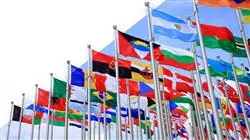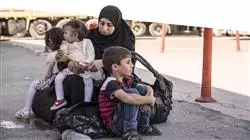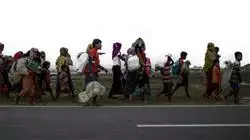University certificate
The world's largest faculty of humanities”
Why study at TECH?
A 100% online Postgraduate diploma will lead you to examine and analyze contemporary migration processes"

Internal, external, temporary, permanent, voluntary or forced migration, whatever the type of population movement and its causes, they have generated, throughout the history of mankind, consequences and effects that have determined the present social and cultural composition. However, a detailed analysis of these transformations can contribute not only to their understanding, but also to the adoption of social policies that have a direct impact on resolving some of the conflicts generated by these migratory processes.
For such a study it is necessary to have an exhaustive knowledge of population theories and existing techniques in order to obtain an adequate study and understand the challenges of the future of the population. In this scenario, Sociology professionals have a great weight given their competences and capacities, which will serve both to make a global observation of each situation and a specific contribution to the interpretation of each reality. In order to contribute to this specialization, TECHprovides this University Expert in Demographic Analysis of Migrations, which takes students for 6 months into a theoretical-practical syllabus that can be accessed freely, at any time of the day, from a computer, tablet or cell phone.
A 100% online program, without classes with fixed schedules and where students can distribute the teaching load according to their needs. These are the characteristics of this degree, which also provides the most advanced knowledge on the different sociological and economic theories on population, demographic projections, micro and meso factors of migration or the management of migration flows.
Likewise, the Relearning system, used by TECHin all its programs, allows the graduate to get into the syllabus in a natural way, even reducing the hours of memorization and study so frequent in other methodologies.
This is an excellent opportunity for professionals to study a university degree that gives them the flexibility of being able to combine their work and/or personal responsibilities with a Postgraduate diploma that is at the academic forefront.
A university program that will allow you to carry out a Demographic Analysis of Migration and provide with this knowledge a practical vision"
This Postgraduate diploma in Demographic Analysis of Migration contains the most complete and up-to-date program on the market. The most important features include:
- The development of case studies presented by experts in Sociology and social processes
- The graphic, schematic, and practical contents with which they are created, provide practical information on the disciplines that are essential for professional practice
- Practical exercises where self-assessment can be used to improve learning
- Its special emphasis on innovative methodologies
- Theoretical lessons, questions to the expert, debate forums on controversial topics, and individual reflection assignments
- Content that is accessible from any fixed or portable device with an Internet connection
Enroll now in a university degree that will immerse you in contemporary migration processes and the macro-sociological factors that distinguish them”
The program’s teaching staff includes professionals from the sector who contribute their work experience to this training program, as well as renowned specialists from leading societies and prestigious universities.
Its multimedia content, developed with the latest educational technology, will allow the professional a situated and contextual learning, that is, a simulated environment that will provide an immersive training programmed to train in real situations.
The design of this program focuses on Problem-Based Learning, in which the professional will have to try to solve the different professional practice situations that will arise throughout the academic course. For this purpose, the student will be assisted by an innovative interactive video system created by renowned experts.
Get an engaging insight into classical and modern population theories through this university program"

TECH gives you the freedom to access this program whenever you wish and to distribute the course load according to your needs"
Syllabus
This Postgraduate diploma in Demographic Analysis of Migration consists of a study plan structured in 3 modules, which will provide students with the most advanced knowledge on demographic transition, classical and modern population theories, the most effective analysis tools and the evolution of migration processes. All this through an attractive and entertaining content based on video summaries of each topic, videos in Focus, essential readings and practical case studies that will lead students to obtain a learning that will boost their professional career in the field of Sociology.

A study plan through which you will be able to advance in a natural and progressive way thanks to the Relearning system. Enroll now”
Module 1. Population Theory
1.1. Demography as Social Science Discipline
1.1.1. Sources for Population Study
1.1.2. Population Studies
1.1.3. Demographic Phenomena
1.2. Population History
1.2.1. Demographic Transition
1.2.2. Second Demographic Transition
1.2.3. Reproductive Revolution
1.3. Classic Theories of Population
1.3.1. La General Law of Malthus Population
1.3.2. Concept of Eugenism
1.3.3. Mill
1.4. Modern Theories of Population
1.4.1. Modernity and Population
1.4.2. Evolutionary models
1.4.3. Demoeconomic models
1.5. Demographic Phenomena
1.5.1. Demography and Population
1.5.2. Differences Geographical
1.5.3. Cultural Differences
1.6. Human Ecology and Demographic Studies
1.6.1. Relationship of Human Beings with Nature
1.6.2. School of Chicago
1.6.3. Sociological Variables in Demography
1.7. Physical Anthropology and Demography
1.7.1. Impact of Anthropology on Demography
1.7.2. Impact of Culture on Demographic Processes
1.7.3. Ethnology and Phenomenology
1.8. Population, Technology and Resources
1.8.1. Introduction Definition of Resource
1.8.2. Types of Resources
1.8.3. Population, Resources and Technology: the Ackerman Model
1.9. Population and Environment
1.9.1. Theoretical Basis of the Debate on Population-Environment Relation
1.9.2. Ecological Footprint
1.9.3. Concept of sustainable Development
1.10. Future of the Population
1.10.1. Demographic Projections: Concepts, Techniques and Methods
1.10.2. The World to Come: the Three Demographic Scenarios and Their Consequences
1.10.3. Future Challenges of the World Population
Module 2. Demographic Analysis
2.1. Fundamentals of the Population Science
2.1.1. Importance of the Population Science
2.1.2. Gender Perspective
2.1.3. Intersectionality in Demographic Analysis
2.2. Population Analysis Tools
2.2.1. Why We Should Conduct Demographic Analysis
2.2.2. Determinant Factors
2.2.3. Methods and Techniques.
2.3. The Partner
2.3.1. Measuring Cohabitation
2.3.2. Marriage
2.3.3. Divorce
2.4. The Children
2.4.1. Fecundity and Infertility
2.4.2. Birth Rates
2.4.3. Maternity and Paternity Delay.
2.5. Mortality
2.5.1. Gross Mortality Rate
2.5.2. Longevity: An International Overview
2.5.3. Impact of Mortality on the Population
2.6. Training Mobility
2.6.1. Definition of Mobility
2.6.2. Migration Rates
2.6.3. Immigration and Emigration
2.7. Measurement and Analysis of Population Structure
2.7.1. Historical Changes
2.7.2. Composition
2.7.3. Population strata
2.8. Gender Inequality Measurement
2.8.1. Indicators of Evaluation
2.8.2. Design of Indicators for Women's Empowerment
2.8.3. Reproductive Control and Family Formation: International Guidelines.
2.9. Measurement and Analysis of Population Growth
2.9.1. Population Growth
2.9.2. Measurement and explanations
2.9.3. Demographic Transition Theory
2.10. Interdisciplinarity: Sociology and Demography
2.10.1. Social Innovation as a Resource
2.10.2. Sociocultural Perspective
2.10.3. Esthetics Analysis:
Module 3. Migratory Processes
3.1. Migration in the Contemporaneous World
3.1.1. Conceptual Basic Framework
3.1.2. Historical and Contemporary Trends in International Migrations
3.1.3. Registration: Statistics and Demographic Sources
3.1.4. Recent Trends and Issues, Global Problems and Challenges
3.2. Explanatory Models and Macro-Sociological Factors
3.2.1. The Attraction-Expulsion Model
3.2.2. The Historical-Structural Perspective
3.2.3. The Center-Periphery Model
3.2.4. Theories of Polarization
3.3. The Theory of Labor Market Segmentation
3.3.1. Evidence of Segmented Migration
3.3.2. The Logics of Adjustment Processes
3.3.3. The Dynamics of Accumulation
3.4. Micro and Meso Factors of Migrations
3.4.1. Rational Choice Theory and Individual Action
3.4.2. Theories of Social Ties and Social Capital
3.4.3. Theories of Social Mobility and Social Ties
3.4.4. Inequality and Migration
3.5. Consequences of Migratory Movements
3.5.1. On Migrants and their Families.
3.5.2. On the Receiving Societies
3.5.3. In the Societies of Origin
3.5.4. In the international and Transnational Sphere
3.6. Management of Migration Flows
3.6.1. Border Control
3.6.2. Recruitment at Origin
3.6.3. Circular Migration and Co-Development
3.6.4. Licenses
3.6.5. Reception and Settlement Policies
3.7. Social Integration and Frameworks for Analysis
3.7.1. Importance of Multiculturalism
3.7.2. Assimilation, Melting Pot and Multiculturalism
3.7.3. Cultural Pluralism and Segmented Assimilation, Transnationalism
3.8. Indicators of Integration in the Short and Long Term
3.8.1. Importance of the Integration. in the Social Context
3.8.2. Case Studies: Integration in the Socioeconomic and Community Environment
3.8.3. Integration of First- and Second-Generation Migrants
3.9. Citizenship and Participation
3.9.1. Importance and Concept of Participation in the Field of Citizenship
3.9.2. Immigration, Participation and Citizenship
3.9.3. Transnational Citizenship, Dual Nationality and Transnationalism
3.10. Effects of Globalization on International Migration
3.10.1. What is Globalization?
3.10.2. About the economy
3.10.3. About the Labor Market

This program will allow you to learn about the effects of globalization on migration, the economy and the labor market"
Postgraduate Diploma in Demographic Analysis of Migrations
Migrations are a social and demographic phenomenon of great relevance today. Understanding its causes, patterns and consequences is essential to analyze and address the challenges it poses globally. At TECH Global University, we offer you the Postgraduate Diploma in Demographic Analysis of Migrations, where you will acquire the necessary skills and knowledge to understand this phenomenon in depth and contribute to the development of effective policies and strategies. This education program is designed for professionals and students interested in the field of demography and migration. Through online classes, you will have access to up-to-date content, case studies and research tools that will allow you to analyze and evaluate migration flows from a demographic perspective. In the Postgraduate Diploma you will explore the main theories and approaches related to migration and its impact on society. You will study the factors that influence migration decision-making, such as economic, political and social conditions, as well as transnational links and migration networks. You will learn to use demographic and statistical techniques to analyze and represent migration flows, as well as to project and estimate the impact of migration on the population of origin and destination. In addition, you will explore the effects of migration on aspects such as demographic structure, family dynamics and spatial distribution of the population.
Be a great professional with the best online education in the world
The program will also address relevant topics such as labor migration, forced migration and internal displacement, as well as migration management policies and strategies. You will analyze the economic, social and cultural implications of migration, and evaluate measures for the integration and protection of migrants. Enroll in the Postgraduate Diploma in Demographic Analysis of Migrations at TECH Global University and become an expert in the demographic analysis of migrations. Understand migration flows and their implications, and contribute to generate data-driven solutions to the challenges posed by migration in contemporary society.







